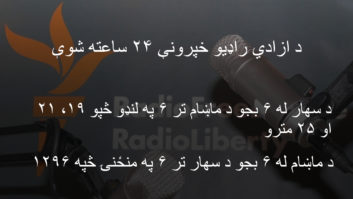Since April 28, a weekly Azerbaijani language news magazine broadcast to the country on the Medya TV channel from Turkey has been interrupted with jittery images, distorted sound and static, according to the Radio Free Europe/Radio Liberty.
The news magazine in question belongs to a cluster of Azerbaijani language programs shown on Turksat, including “Azerbaijani Hour” (‘Azarbaycan Saati’), a program distributed by an opposition political party.
RFE/RL says the documented pattern of disruption to its satellite news service could indicate a new level of deliberate interference, a practice known as “jamming.” The practice is a violation of international telecommunications regulations.
On three successive weekends, another show, “Different News” (‘Ferqli Kheberler’), registered interference that began four to five minutes into programming and ended shortly after it concluded.
In an attempt to get around the interference, the show was subsequently placed on a different satellite and two other channels, Denge TV and Sivas SRT. On each occasion, engineers with the U.S. International Broadcasting Bureau documented electronic noise and distortion, most recently on June 16.
Kevin Klose, RFE/RL acting president and chief operating officer, said in a released statement that, “These developments are serious” and “should be investigated by Azeri and international telecommunications authorities.”
Ertogrul Akman, general manager for Major Media, which handles placement of programs on Turkish media, called the interference on June 16 “unprecedented.”
There is certainly a history, however, of growing attempts at censorship here. In 2009, RFE/RL’s Azerbaijani-language service, known locally as Radio Azadliq, was banned from local FM airwaves by Azeri authorities, a restriction that prompted the search for broadcast alternatives, including on satellite.
The service’s journalists have subsequently endured defamation campaigns, death threats, physical attacks and other forms of intimidation, none of which the Azeri authorities have investigated, according to RFE/RL.
And just earlier this month, President Ilham Aliyev signed into law a bill criminalizing online defamation. Reporters Without Borders has ranked Azerbaijan 156 out of 179 countries surveyed in its 2013 Press Freedom Index.
The RFE/RL would continue to monitor and report its findings, Klose said.
In others news from the BBG, listening numbers are up.
According to a release from the Broadcasting Board of Governors, U.S. international media’s weekly audience has reached a new high of more than 203 million people, up 16% since official figures were last released by the agency, in November.
The BBG gives credit for its steady growth over the years (up from 165 million listeners in 2010) to its growing audience in Latin America, where reportedly more than 26 million people tune in to Voice of America; along with global innovations across digital media platforms and expanded networks of distribution for its programs.
For example, this year, the BBG set up FM stations in South Sudan, Mali and Libya; TV affiliates in Burma and Russia; and digital content platforms such as SoundCloud, a smartphone app for audiences in Cuba and SMS news service in Nigeria.












